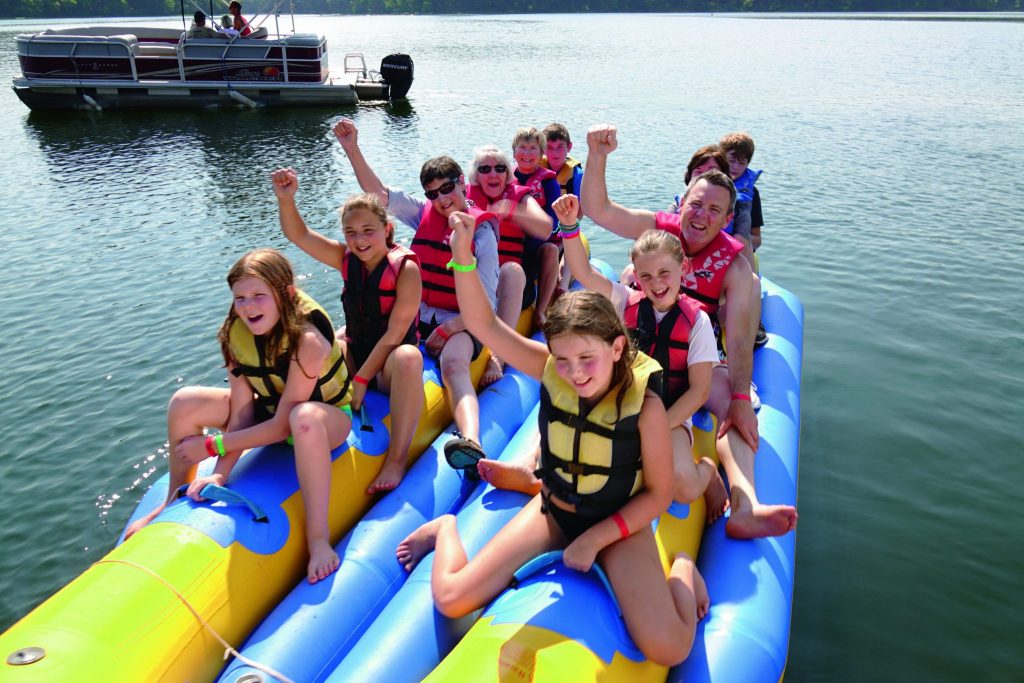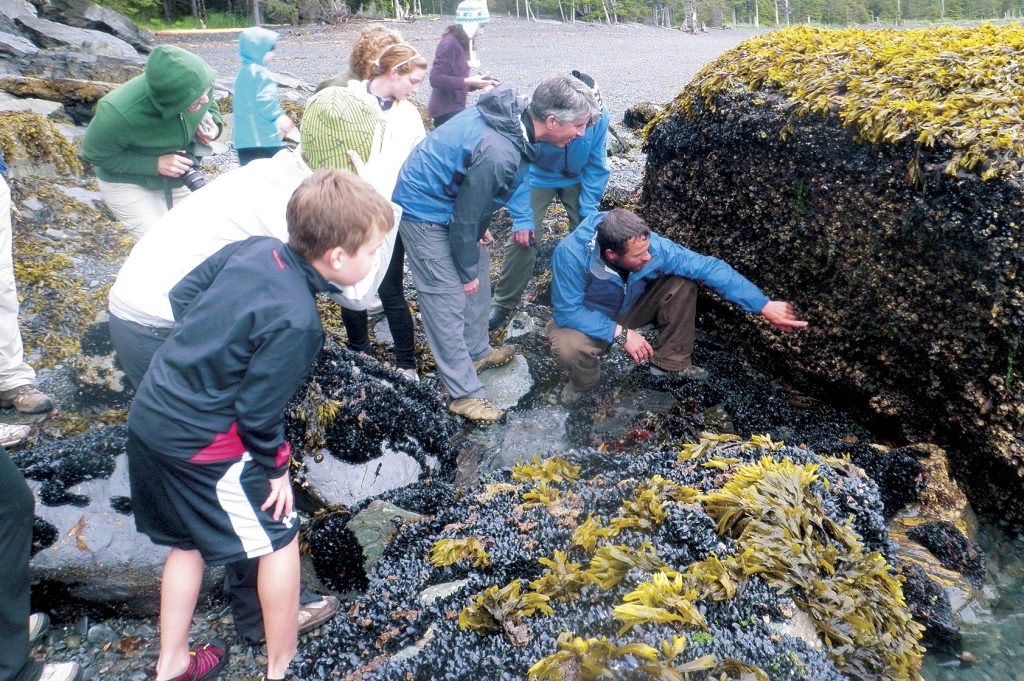How to Get Paid to Travel: Adventure Jobs with Room & Board
Guest post by long-term traveler Jacqueline Boss
It’s easy to be dazzled by the romantic allure of a nomadic, no-roots lifestyle. But as with any path less taken, the way can seem hazier, scarier and more dangerous. I’m here to tell you, as someone who has been paid to travel for 10 years, that it’s not only simple to become a permanent wanderer, but also that you don’t need to be wealthy or retired to do it.
There is a vibrant subculture of travelers doing jobs in beautiful places and living on site in employee housing. Here’s how you can find these jobs and travel indefinitely while saving money.
What are these adventure travel jobs?
Companies that provide housing are usually (but not always):
– In the tourism industry
– In destination locations
Every summer, idyllic lakeside summer camps and remote wilderness lodges bloom to life, requiring a huge amount of temporary staff. The same happens each winter at ski resorts, when tourists flood into picturesque mountain towns, spending time both on the slopes and at the surrounding businesses.
Types of Jobs
The most common ‘get paid to travel’ jobs you’ll come across are:
– Wilderness lodge staff
– Retreat & conference center staff
– Ski & snowboard instructor
– Ski resort staff
– Teach English as a Foreign Language
– Maintenance crew
– Au pair
– Cruise ship staff
– Camp counselor
– Hostel operations
– Farm & garden
– Food & beverage
– Campground crew
– River & kayak guide
– Tour guide
– Retail
No two adventure jobs will be the same, and no two travelers will have the same experience at the same company. This is one of the things that makes it worth doing.
My own ten-year journey has taken me to a retreat center in the middle of the Hawaiian jungle, one mile from the locals’ secret black-sand beach with a weekly drum circle. Clothing not required.
It’s taken me to the deep snow of a cozy Colorado mountain ski town, to a lush and quiet Buddhist center tucked into a valley in the Catskills, to a postcard-perfect coral lagoon bordering a small Virgin Island community.
It’s taken me on mock missions to space inside a replica space shuttle, to brush-speckled hills where black and grizzly bears foraged together for huckleberries. I’ve been able to watch the Perseid meteor shower from a boat dock in a protected wilderness area, and to sleep by a campfire with my friends in the mountains of the west.
Every day is different in the life of a seasonal adventure traveler. It’s colorful, it’s messy, it’s beautiful, and it’s uniquely yours.
Recreational Benefits
Some of the most enticing perks of the jobs are the non-monetary benefits. Companies generally share the guest facilities and equipment with the staff for free. Some companies throw events or empower the staff to come up with their own events.
Some of my favorite free benefits and activities have been:
– Kayak and canoe access
– Book-themed costume nights
– Talent shows
– End-of-the-world parties
– Hiking trails on property
– Attendance at guest workshops and events
– Staff Olympics
– River rafting
– Skiing and snowshoeing
– Jeep adventure tours
– Jungle dances
Pay
Entry level positions will usually pay minimum wage or slightly more.
The places I’ve been most effective at saving money (nearly all of it, after housing deductions) have been those that also have staff dining halls. National Park concessioners often provide meals, as do many other companies.
It’s simple to save your entire paycheck, but it does take discipline. I’ve seen too many coworkers spend their last dollars on a six pack. It really pays to save.
Some people save so well that they plan to work only half the year, usually the summer months. The money they earn lets them travel to a cheaper tropical country or spend time with family in the winter. This is the heart of getting paid to travel.
What jobs are available to someone with little experience?
Plenty.
The easiest jobs to get are:
– Housekeeper
– Camp counselor
– Prep cook
– Ski lift operator
– Dishwasher
Even with no experience or college degree, these entry level jobs are easy to get. Housekeeping is the easiest position to get of all.
In any position, do your best and prove yourself as a good worker and you can fairly quickly become a supervisor, sometimes within a season. A high-school aged friend of mine was promoted from housekeeper to housekeeping supervisor within a few weeks of arriving at her first seasonal job.
As you gather more experience, lots of exciting job opportunities come within reach.
There are customer service positions from front desk to activities leaders. You could be a hiking or kayak guide, or an art or ecology teacher. There are roles in ritzier companies that run small charter cruises and adventure travel tours for high-paying guests. Some seasonal travelers choose to Teach English as a Foreign Language (TEFL) and find schools abroad.
Life on the job
Housing
Through your journey you’ll live in a motley assortment of rooms.
My coziest dwelling was a two-story private cabin for my boyfriend and I in the snowy Northwoods of Minnesota, overlooking a quiet lake. I enjoyed a sunny California island studio with windows on three sides. I took baths in a shared room in Hawai’i. And I do mean in the room, bathtub in full view of the three beds. I’ve been in a tent, in apartments, old motel and new hotel rooms, standard dorms, and once, in a primary-colored and windowless bunk room at a kids’ camp.
Usually you’ll be given random roommates, though there are sometimes options for single rooms and couples rooms.
It’s easy to find out what housing is like if you just ask the company. Many will also describe their staff housing on the employment sections of their websites.
Meals
Your meal plan will vary by company, ranging from nothing (you’d be given kitchen access) to three full, fresh, hot meals per day and an all-hours snack bar.
The best food situations to be found are at retreat centers, which cater to a fit, healthy, clientele. At these spiritual hubs, I’ve been treated to delicacies like liliko’i chia pudding, dahl and naan, buddha bowls, and barbecue from local wild pigs.
National Park concessioners and lodges often have employee dining rooms (EDRs) with impressive and varied selections. A favorite workplace of mine offered not only hot meals but also a full, healthy salad bar and panini press. And mmm, those curly fries.
Also, coffee. ALWAYS coffee. I always had access to free or $1 coffee. The good stuff too, freshly ground.
Coworkers
Coworkers quickly become family.
Living and working in a small, tightly-knit community of travelers is an experience more like college or camp than anything you’ll find in the “real world.” It’s far easier to make friends, even if you’re shy or introverted. It’s an amazing feeling to reconnect with other people in such a deep way.
There’s always someone around to go on an adventure with – friends to explore the outdoors and sing in the car and do art with you.
You’ll be working with people from around the world, another major benefit of getting paid to travel. They’ll be of all ages, education levels, and on different paths in life. Some of them will be the best friends you’ve ever had. Some of them will be people you’ll date, and as is not infrequently the case at these sorts of places, you may find your future partner in marriage.
Jobs with larger companies can be fun, especially when pre-season staff orientation includes the entire team. This is a fantastic bonding experience and a chance to ease into a new job.
What About Days Off?
Most of these jobs are in stunning locations, which means your leisure time will be full of free outdoor recreation opportunities.
Many people you meet will enjoy being in nature. They might like hiking, kayaking, camping, and hanging out at the beach or the lake. Especially at places where employees eat meals together, it’s incredibly easy to find someone to adventure with for the day.
How to find jobs, apply, and get hired
Find jobs on WanderJobs
The simplest way to find adventure travel jobs with housing is to use WanderJobs.com. It’s the only job board which requires companies to provide housing to employees in order to post a job.
There are many more websites, most much smaller, where you can find similar jobs or jobs in more specific career fields, like yoga, SCUBA, TEFL, and more.
Here’s a mega-list of 100+ resources you can use to find adventure jobs with housing, as well as volunteer work-exchanges, home swaps, and Couchsurfing alternatives.
Write a cover letter!
Cover letters are very important. I’m convinced I’ve had such a high hire rate because of the enthusiasm I’ve expressed in my cover letters. My secret? I only apply to one or two jobs each season that I’m really, genuinely excited about. Then I write from the heart.
Take time learning how to write a good cover letter and have someone objective read it over for you and give you feedback. After a while you’ll get a feel for it and be able to do the process entirely on your own.
Interview
Always check Glassdoor before your interview. In many cases, I’ve been able to find the exact interview questions I’ll be asked, giving me time to prepare my answers in advance. When specific questions aren’t available, find a general list of interview questions online and practice with those.
Interviews make most people nervous, sometimes even the interviewer! So just relax and consider it a chance to have a fun chat. Meditate for 10 minutes beforehand, exercise, do something that will make you proud of yourself. Just do anything besides sitting and worrying.
Pros & cons
The best parts:
– Live in places people pay to vacation
– Incredible learning & growth experience
– Reconnect with people & nature
– Easy to climb ladder within a company
– Easy to save money
– Lifelong friendships
The challenges:
– Low pay
– Short career ladders
– Very difficult to say goodbye
– Hard to explain your lifestyle to others
Volunteering & work-exchanges
Travel jobs aren’t the only solution for people who want to travel long-term. Other travelers prefer volunteering and doing work-exchanges (working 5 or so hours daily in exchange for room and board). These are usually shorter-term, anywhere from a few days to a few months.
By far the best site for work exchanges worldwide is Workaway, and WWOOF is a popular choice for volunteers who want to farm.
Begin your adventure!
If this all sounds fantastic, well, yes it is. But, like anything, it is what you make of it. You can’t show up and expect an adventure to just happen to you. You have to put yourself out there and be vulnerable enough to make new friends and try new things. That’s when the magic happens.
Go. Go toward the magic.
The post How to Get Paid to Travel: Adventure Jobs with Room & Board appeared first on Wandering Earl.















